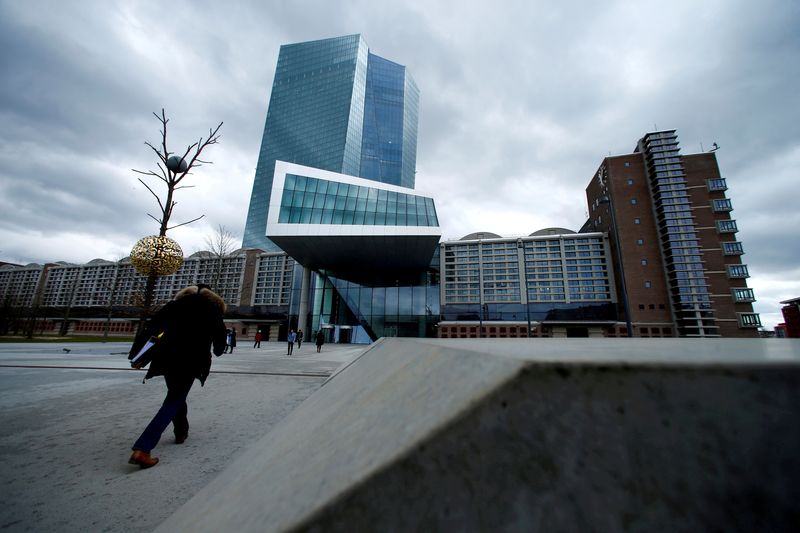
FILE PHOTO: European Central Bank (ECB) headquarters building is seen in Frankfurt, Germany, March 7, 2018. REUTERS/Ralph Orlowski
October 27, 2021
By Balazs Koranyi and Francesco Canepa
FRANKFURT (Reuters) – The European Central Bank is all but certain to keep policy unchanged on Thursday and push back against growing expectations for an interest rate hike next year, even though it may admit that inflation will be higher than projected.
Having already flagged big policy decisions coming in December, ECB President Christine Lagarde will set the stage for rolling back emergency stimulus.
But she is likely to emphasise once more that the ECB is in no hurry to tighten its policy further, even if some of its peers are already hiking rates or planning to do so.
She will have her work cut out convincing investors that this is the right path to follow, however. They have growing doubts about the ECB’s narrative that inflation is temporary and rate hikes are still far into the future.
This has created a big gap between market expectations and the bank’s own guidance that rates will stay low until inflation is seen stabilising at 2%.
Indeed, markets are now pricing in some chance of a hike next autumn and expect inflation to be around the ECB’s target level in the coming years, both well out of line with the bank’s own projections.
ECB chief economist Philip Lane has already tried to push back against these expectations, arguing that they were “challenging to reconcile” with the bank’s own guidance.
But that intervention had a modest effect, so Lagarde may need to be even more explicit in telling investors that they are reading the central bank wrong.
The disconnect is all down to inflation. Analysts predict that price growth may hit 4%, twice the ECB’s target, this year due to a long list of one-off factors, and it will likely sink back more slowly than the ECB wants to admit.
Even if temporary, such a price surge could boost underlying price pressures and, if it lasts long enough, impact wage setting.
High energy prices could also force companies to adjust their price-setting behaviour to account for higher costs.
The ECB says this is not happening but markets are taking a different view.
“Lagarde should, and will probably try to, counter this repricing more forcefully,” UniCredit economist Marco Valli said.
“An important feature of the ECB’s rate guidance, which markets may now be overlooking, is that its formulation greatly reduces the scope for pre-emptive tightening.”
CAUTION
Come December, the ECB is likely to decide to end emergency stimulus next March, but it may ramp up another support scheme to pick up the slack and keep borrowing costs down.
It has plenty of reasons to be cautions.
Hard data is not showing any alarming wage increases that would point to more durable inflation, and analyst forecasts fall short of the ECB’s criteria for hiking rates.
The ECB has also undershot its target for nearly a decade so a premature move would hit its credibility especially hard.
Policymakers also keenly remember the bank’s rate hike on the eve of the bloc’s debt crisis a decade ago, arguably the biggest policy error in the history of the institution.
“For the ECB to hike rates, it is probably not enough for wages to rise more strongly again in the face of an improved situation on the labour market and high inflation rates,” Commerzbank economic Michael Schubert said.
“Rather, they would have to rise so fast and so strongly that the decline of inflation due to the expiry of transitory effects in the coming year is prevented,” he said.
Finally, a notable economic slowdown in the coming quarter also argues in favour of cooler expectations for tighter policy.
With much of the bloc’s industry suffering from some level of supply shortages, growth is likely to slow with a fresh wave of the coronavirus pandemic likely hitting services, too.
All of this adds up to suggest a cautious tone from the ECB with a repeat of the argument that even the removal of emergency stimulus is just a recalibration of policy not the withdrawal of support.
The ECB’s policy decision is due at 1145 GMT, followed by Lagarde’s news conference at 1230 GMT.
(Reporting by Balazs Koranyi; Editing by Hugh Lawson)
